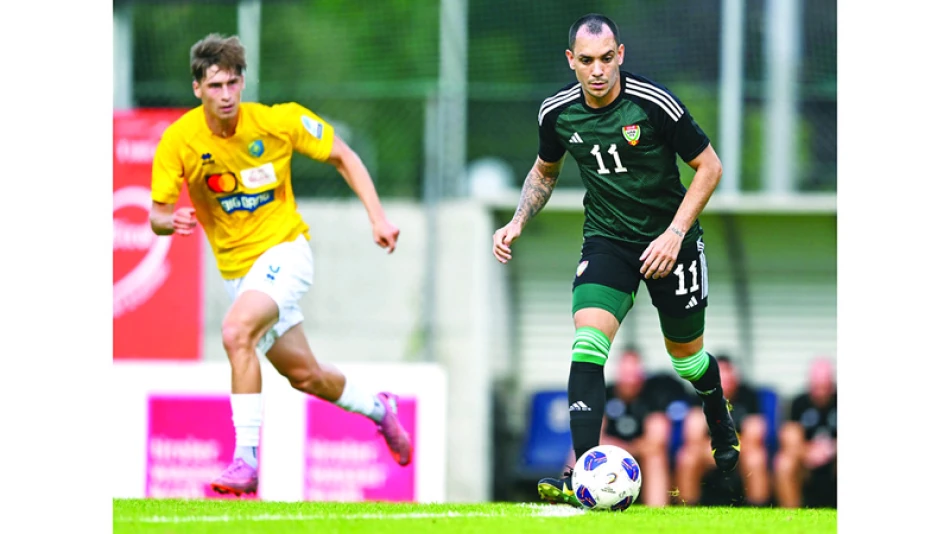
Saudi Coach Misfir Sees National Team on the Right Track, Defensive Lapses Need Fixing
UAE Football Team Faces Critical Defensive Crisis Ahead of World Cup 2026 Qualifiers
The UAE national football team stands at a crossroads as former coach Dr. Abdullah Musfer warns of persistent defensive vulnerabilities that could derail their historic World Cup 2026 qualification hopes. Despite Romanian coach Cosmin Contra's tactical adjustments and recruitment of five new players, fundamental defensive issues remain unresolved just weeks before crucial playoff matches against Oman and Qatar in October.
Romania's Contra Implements Strategic Overhaul
Under Contra's leadership, the UAE has adopted a comprehensive preparation strategy, establishing training camps in Austria and scheduling friendly matches against Italian side Lecce and Slovenian club Bravo. This European-focused approach mirrors successful models employed by other Gulf nations seeking to elevate their football standards through exposure to higher-level competition.
The Romanian coach has experimented with defensive formations, introducing players like Lucas Pimenta, Kwame Quaido, Marcos Meloni, and giving Eric de Menezes his first starting opportunity. These tactical shifts represent a clear acknowledgment of the team's defensive frailties that have plagued performances over the past two seasons.
Defensive Weaknesses Threaten World Cup Dreams
Central Defense Remains Major Concern
Musfer's analysis reveals that the center-back position continues to be the team's Achilles' heel, with consistent errors undermining overall team performance. This vulnerability has been particularly evident in recent matches where the UAE demonstrated strong attacking capabilities but conceded crucial goals due to defensive lapses.
Full-Back Positions Need Reinforcement
Both right-back and left-back positions show structural weaknesses, while the defensive midfield role lacks the stability required for international competition. These interconnected defensive issues create a domino effect that compromises the team's ability to maintain leads and control match tempo.
Attack vs Defense: The Strategic Dilemma
While the UAE boasts an impressive array of attacking options, bolstered by recently naturalized players holding Emirati citizenship, Musfer emphasizes that defensive solidity must take priority. Recent matches have demonstrated the team's scoring ability, but defensive fragility continues to undermine positive results.
This approach aligns with successful World Cup qualification strategies employed by nations like Australia and Peru in previous cycles, where defensive organization provided the foundation for tournament progression.
Market Implications and Regional Competition
The UAE's World Cup qualification bid carries significant economic implications, with successful qualification potentially generating substantial revenue through sponsorship deals, broadcast rights, and tourism. Regional competitors like Saudi Arabia and Qatar have invested heavily in football infrastructure, creating pressure on the UAE to match these standards.
The integration of naturalized players reflects broader Gulf trends toward talent acquisition, similar to Qatar's successful model leading up to the 2022 World Cup. However, this strategy requires careful tactical integration to maximize effectiveness.
October Showdown: High-Stakes Playoff Reality
The upcoming matches against Oman on October 11 and Qatar on October 14 represent the UAE's most significant football opportunity in recent years. Unlike previous qualification campaigns that allowed for gradual improvement, this playoff format demands immediate tactical solutions and mental resilience.
The margin for error has effectively disappeared. Defensive mistakes that might be acceptable in friendly matches or group stage competition could prove catastrophic in knockout-style playoffs where single goals often determine World Cup participation.
Path Forward: Tactical Pragmatism Required
Contra's challenge lies in balancing defensive stability with attacking ambition within a compressed timeframe. The Austrian training camp and European friendlies provide limited opportunities to address fundamental defensive coordination issues that typically require months of tactical drilling.
Success will likely depend on implementing a pragmatic approach that prioritizes defensive organization while utilizing the team's attacking strengths in calculated moments. This strategy proved effective for nations like Iceland and Wales in recent major tournaments, where defensive discipline enabled smaller nations to compete against traditional powers.
The UAE's World Cup 2026 qualification hopes now rest on Contra's ability to transform defensive vulnerabilities into competitive advantages through tactical innovation and player development in the crucial weeks ahead.
Most Viewed News

 Sara Khaled
Sara Khaled






